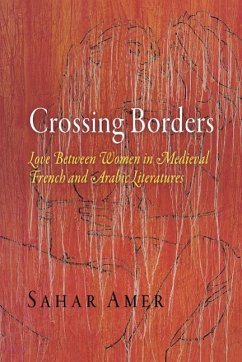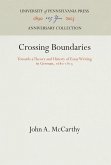Crossing Borders Love Between Women in Medieval French and Arabic Literatures Sahar Amer Winner of the 2009 MLA Aldo and Jeanne Scaglione Prize for comparative literary studies "Crossing Borders is a bold and groundbreaking work. Situated at the nexus of queer theory and postcolonial medievalism, it interrogates and seeks to conjoin two significant areas of inquiry: the literary representation of lesbianism and the influence of Arabic traditions on medieval French narrative. Working across a range of genres in both languages, Sahar Amer unearths hitherto unrecognized allusions to lesbianism in Old French texts, arguing that these represent traces of Arabic influence on the key genres of romance and epic."--Sharon Kinoshita, University of California, Santa Cruz "A must read for scholars working in Arabic and European medieval studies, postcolonial theory, queer theory, gender and sexuality, comparative literature, and a variety of other disciplines."--Journal of Arabic Literature Given Christianity's valuation of celibacy and its persistent association of sexuality with the Fall and of women with sin, Western medieval attitudes toward the erotic could not help but be vexed. In contrast, eroticism is explicitly celebrated in a large number of theological, scientific, and literary texts of the medieval Arab Islamicate tradition, where sexuality was positioned at the very heart of religious piety. In Crossing Borders, Sahar Amer turns to the rich body of Arabic sexological writings to focus, in particular, on their open attitude toward erotic love between women. By juxtaposing these Arabic texts with French works, she reveals a medieval French literary discourse on same-sex desire and sexual practices that has gone all but unnoticed. The Arabic tradition on eroticism breaks through into French literary writings on gender and sexuality in often surprising ways, she argues, and she demonstrates how strategies of gender representation deployed in Arabic texts came to be models to imitate, contest, subvert, and at times censor in the West. Amer's analysis reveals Western literary representations of gender in the Middle Ages as cross-cultural, hybrid discourses as she reexamines borders--cultural, linguistic, historical, geographic--not as elements of separation and division but as fluid spaces of cultural exchange, adaptation, and collaboration. Crossing these borders, she salvages key Arabic and French writings on alternative sexual practices from oblivion to give voice to a group that has long been silenced. Sahar Amer is Associate Professor of Asian and International Studies at the University of North Carolina, Chapel Hill. The Middle Ages Series 2008 264 pages 6 x 9 ISBN 978-0-8122-4087-0 Cloth $59.95s £39.00 ISBN 978-0-8122-0108-6 Ebook $59.95s £39.00 World Rights Literature, Women's/Gender Studies Short copy: Crossing Borders explores cross-cultural representations of gender and sexual practices in the medieval French and Arabic traditions. Amer demonstrates that the medieval Arabic tradition on eroticism played a determining role in French literary writings on gender and sexuality in the Middle Ages.
Hinweis: Dieser Artikel kann nur an eine deutsche Lieferadresse ausgeliefert werden.
Hinweis: Dieser Artikel kann nur an eine deutsche Lieferadresse ausgeliefert werden.








